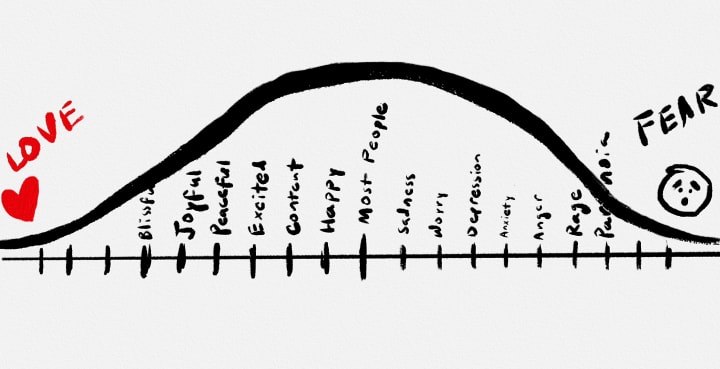The Tao of Entropy
A Confession

Quite recently, two extremely tragic events separated only by seven miles, happened within 24 hours of each other, and while I didn’t personally know any of the people involved, both situations have had a powerful emotional and spiritual impact on me. This is pretty normal for me. I am deeply affected by every school shooting, every disaster, every act of hate, violence, war, or terrorism that comes into my awareness. I don’t always talk about it, but it’s there and it usually requires a lot of work to keep myself from spiraling back into deep depression like I used to.
On Friday, August 4th at about 1:30 p.m., Nicole Lorraine Linton, a registered nurse, sped through a red light going 90 mph and plowed into several cars at a busy intersection, killing six people, injuring eight more, and leaving a trail of fire on the street. A day later, just before 11 a.m., actress Anne Heche raced down the street in the residential community of Mar Vista, and crashed her Mini Cooper into a home, causing a fire that took 59 firefighters over an hour to control. In the first event, the driver lived. In the second event, the driver died, but both were profoundly tragic, causing untold suffering for the survivors and their loved ones.
I didn’t know any of these people, but my heart has broken for them all–the victims and the perpetrators–and in this unconditional love, compassion, and forgiveness, I find peace. I don’t think I could have had this equivalent kind of compassion in the past, but certain things that I’ve learned in the last couple of years, coupled with my more recent dives into the concepts within the Tao, have taught me the value of treating the whole world this way, because the Tao’s perspective on nature can be applied to everything. Let me explain.
According to Taoism, everything that we can perceive is composed of two energies–yin and yang. In truth, they are inseparable, each containing the seed of the other within it, and one can turn into the other.
These are some of the most basic qualities of yin and yang:
Yin
- Feminine
- Receptive
- Dark
- Passive
- Earth
- Cold
- Contracting
Yang
- Masculine
- Transmissive
- Light
- Active
- Sun
- Hot
- Expanding
Although these energies contain opposing qualities, each needs the other to exist in order to express themselves to their fullest potential. They are the two sides of the same coin, thus, one can not be perceived without the presence of the other, because without one another, they simply wouldn’t exist. To define the quality of a thing as either yin or yang is to compare it to something else. It’s all relative, and the definition is contingent upon the perspective of the observer.
For instance, you could say that a cup of tea is yang because it's hot, but only in comparison with something like a glass of iced tea, which is cold, and therefore, yin. However, if you compare the cup of tea to the interior of an oven set at 400 degrees, the hot tea is now yin because it is cooler in relation to the oven.
Consider the concept of entropy for a moment. For the most part, we think of things breaking down and falling into decline and decay when we think of entropy. However, science tells us that the process of entropy is actually the amount of energy that’s released when disorder happens.
A burning stove could be considered in a state of high entropy because the energy within the coal is being released as heat and is randomly dispersed into the air. When we only consider the coal within the stove itself, we’re observing a closed system, but when we realize that the heat released from the coal in the stove is being used to propel a steam train, we are observing the same conditions from a bigger perspective–an open system–and now we can understand how entropy can be a good thing. The coal isn’t just becoming ash—it’s creating an opportunity for transformation because the release of its energy is the catalyst for overcoming inertia. Without it, the coal would remain as it is, and the train would still be sitting at the depot. Burning the coal releases the energy needed to move the train. In this sense, entropy is useful.
The term “entropy” was coined by German scientist, Rudolf Clausius, from the Greek words “en” (“in”), and “trope,” (meaning “turning” or “changing”), which to me, perfectly sums up the process of yin energy becoming yang energy and vice versa. As a matter of fact, this is what the ancient Taoist book, The I-Ching, is about. The title literally translates to “The Book of Changes,” and as we’re learning, change releases energy that can be used for other things.
In our description above, the energy locked in the coal was in a yin state until it was burned and released as heat, which is its yang state. Science tells us that these different expressions of energy are neither good or bad, but are of equal value, and the Tao would agree with this. Yin and yang energies are neither good nor bad, but the expression of the energy determines the quality of our experience. When they’re out of balance, they can be destructive. When they’re in balance, they’re harmonious and constructive.
As I mentioned before, these concepts of energy within the Tao can be applied to everything–and that includes our social systems and structures, as well as ourselves and our personal beliefs. We are no more separated from each other than we are from Nature itself. Everything is connected. We are connected. I will say this again for emphasis because I’ve learned this the hard way, and now I’m making a concerted effort to internalize this wisdom: the quality of our experience in life depends on our perspective.
By this, I mean that the idea of the binary potentials of yin and yang can be applied to how we live our lives. Let’s say that there is a spectrum of perspectives and on the one end is love and the other is fear. Most of us slide back and forth on the spectrum, but for the most part, probably fluctuate somewhere around the middle, creating a bell curve. Few people predominantly occupy the love end of the spectrum, but a good example would be the Dalai Lama or Jesus. Conversely, few people predominantly occupy the fear end of the spectrum, but a good example of this would be Hitler or Stalin. (Imagine how much fear you’d have to feel to cause so much destruction and chaos! I’ve come to believe that the people at this level of fear are the most frightened people in the world.)

Yin and yang can express both healthy and toxic energies, depending on whether or not they’re in balance with one another. Some of yin’s healthy expressions of energy are beauty and tranquility, receptivity, shelter, and nurturing–things that Mother Earth provides for us, just like our own mothers. This is why yin is said to have feminine qualities.
Some of yang’s healthy expressions are generosity, warmth, protectiveness, guidance, and strength–just like our sun and our own fathers, which is why yang is said to have masculine qualities.
However, when yin and yang are out of balance, they both express themselves as toxic energies. Yin becomes victimized, powerless, grasping, and full of despair. Yang becomes angry, violent, greedy, and oppressive. Both expressions are harmful and destructive because both of them are motivated by fear, and fear causes us to lash out and wound others because we have been wounded.
This is how the majority of us are expressing ourselves at this point in time in our current experience on the planet--as toxic energies. Everyone is pointing fingers. Everyone has someone to blame for their suffering, causing us to lash out and wound others, creating more victims and oppressors. In this state, we don't realize that the truth is that the quality of our experience is dependent upon our perspective. If we really want to heal ourselves and make the world a better place, it has to start with changing our perspective, which involves paying attention to our thoughts, identifying our emotions, and moving to a better location on the spectrum. Personally, I want to move as far as I can go along the spectrum, which is to the position of unconditional love.
Fear is the weaker form of energy, whether it’s being expressed as yin or yang, because it’s destructive. It creates poverty, famine, war, disease, and death. Love, on the other hand, is the stronger force. It’s a balancing, harmonizing, and healing form of energy because it’s creative. It has the power to build pyramids, paint masterpieces, go to the moon, and it literally brings life into the world. Hate and fear can’t do that.
I’m not religious, but I do know that there’s a quote in the Bible that says, “Perfect love casts out fear,” and I think it might just be one of the most important statements ever made, because when you begin to focus on unconditional love–love without limit, border, boundary, or exclusion of any person, creature, condition, or event–you let go of fear and begin to live in peace. This means learning to apply unconditional love even to those people and circumstances that most cause our suffering. As a matter of fact, those that cause the most suffering need love more than ever! Maintaining our focus on love can require a lot of effort and we'll still be triggered at times, but if we can steer our attention back to the right end of the spectrum, it pays off in peace. It’s better than any pill or therapist you can find. It’s the true medicine.
As far as I’m concerned, unconditional love, compassion, and forgiveness is the “Christ consciousness” or “Buddha consciousness” that everyone’s talking about. And even for someone who hasn’t read the Bible, I’m pretty sure this is what it means when it says, “Do unto others as you would have them do to you.” No one wants to be hated, judged, or abused, so why do we do it to others?
So you’re probably wondering why I introduced the tragic accidents that took place here in Los Angeles recently. It’s true that as women, both Nicole Linton and Anne Heche largely expressed themselves as yin energy in life, but the fear that drove their actions within that 24-hour span of time was demonstrated in different ways. Whatever demons Anne was struggling with made her turn her fears inward, which is a toxic yin expression, and she ended up destroying herself. Conversely, Nicole’s demons were exhibited outward, which is a toxic yang expression, and she ended up destroying others.
Ultimately, both toxic expressions ruin everyone involved, because even when we think we're only harming others, we suffer too-- and vice versa. Others suffer when we think we're only harming ourselves. There really is no separation.
As Nicole’s situation demonstrates, women can express toxic masculinity, but men can express toxic femininity as well. They too can feel victimized. They too can feel despair and powerlessness. Remember: everything contains both masculine and feminine energies, both yin and yang, and neither one is inherently good or bad– they just are, and they’re both necessary for our existence.
When we understand this, we see that there isn’t some god with a checklist waiting to punish and destroy us for all of our misdeeds. We reject the idea that God is a punishing god because we know that we have free will and the option to choose to live from a place of love or fear. A god that controls our freedom isn’t a loving god, and a punishing god isn’t much of a god at all if he puts his energy into destroying the very things he created.
We’re able to reject any judgmental god, because in punishing us, that god would be working with “the devil,” who, according to religion created by man (and not the spirit of Nature), wants us to suffer in hell for our sins. Well, I’ve got news for you—living in fear is hell, and we’re already there. Hell is a creation of our own, and we built it through fear. Things will get worse if we don’t learn to love unconditionally, forgive, and have compassion--if we don't change. That is inertia.
When we understand this, we know that we are our own demons and our own angels. The only difference is where we choose to stand on the spectrum, because if the good guys hate the bad guys, they’re no different.
We also see that no one is special, no one is chosen or excluded, and without a doubt, no one is any better or any worse than anyone else. We are all of equal value and worth, no matter what kind of color, shape, size, or condition we’re in. We're all just localized expressions of Life Itself (the Tao, God, the Universe, the field) experiencing Itself through “us” (you and me and everything else we can see) in infinite unique ways. (Amazing!)
We begin to see that life isn’t out to get us—that everything happens for a reason, both good and bad, and it's happening for us—not to us. Everything happens for our growth and evolution, because it takes some entropy-- some breaking down-- in order to release the energy for change.
When we see that things just happen–good things and bad things--we understand that it's all just part of the experience of Life. This gives us the strength to face our fear and suffering with love and see what it’s trying to teach us. This is an alchemical moment, because facing our suffering enables us to release our fear, and this is the entropy—the cusp, the fulcrum, the pivotal point—upon which change begins. Fear, however, only maintains inertia and things never get better. They just continue to get worse.
When change happens, we can allow that energy to continue to be randomly dispersed into chaos and disorder, or we can bring it into harmony and balance, harnessing it and using it to build something better--a world united in peace, mutual respect, and cooperation. This is true strength. We can do this by recognizing that we’re not really so different and we’re certainly not separate from one another. We are all composed of good and bad, light and dark. We are all parts of the same Whole. Yin cannot be stripped from yang without destroying them both completely. In spite of appearances, we are One– the Singularity expressing itself as an infinite number of dualities, all of them perfect and whole, just the way they are.
When we surrender to our Wholeness in love and appreciation for the entirety of our experience, we can relax and trust in the Universe to take care of everything, because everything serves a purpose– even entropy, the mechanism that provides opportunities for change and evolution (or growth, if you're more comfortable with that language).* If the universe knows how to grow a tree from an acorn, I'm pretty sure it knows what it's doing.
This surrender takes a leap of faith, but trust me– the way we’ve been doing things for the last couple millennia have not been working. It’s time to try something new, and until we love, forgive, and feel compassion for every aspect, every facet, every light and every shadow of ourselves and each other as the One we truly are, we will continue to live in fear and court our own destruction.
This–THIS is why I want to love and forgive unconditionally–because I not only want to live, but thrive–and the only way to really do this is if we build a better world for us all by bringing our energies into harmony and balance. Only love has the power to do this, so this is what I choose. I choose the braver option.
*Incidentally, I believe that homosexuality's purpose is to help control the population of the human species. We should all be thanking the LGBTQ+ community not only for this, but for the color, creativity, and ingenuity they contribute to humanity.
About the Creator
Brijit Reed
Freelance ghostwriter, editor, and screenwriter striving to create a better world. Words and images are just the beginning.
Reader insights
Outstanding
Excellent work. Looking forward to reading more!
Top insights
Easy to read and follow
Well-structured & engaging content
Expert insights and opinions
Arguments were carefully researched and presented
On-point and relevant
Writing reflected the title & theme
Excellent storytelling
Original narrative & well developed characters
Eye opening
Niche topic & fresh perspectives
Heartfelt and relatable
The story invoked strong personal emotions






Comments (5)
Really well written, i feel this should be part of a book!! keep writing
Well written. I am glad you found tools to help you thru your depression 🥰 This remind me of my poem ,I made. Very informative. I did study a little bit on Chi
Really good piece. I’ve been thinking a lot about this.
This was very informative and very interesting as well. I always mix up yon and yang, so thank you for sharing their basic qualities. I loved this!
Unconditional love, forgiveness, and compassion are on the love side of the spectrum. Positivity side! While fear, toxic negativity is the opposite end. Awesome piece and loved the read!!! 😊💖💕